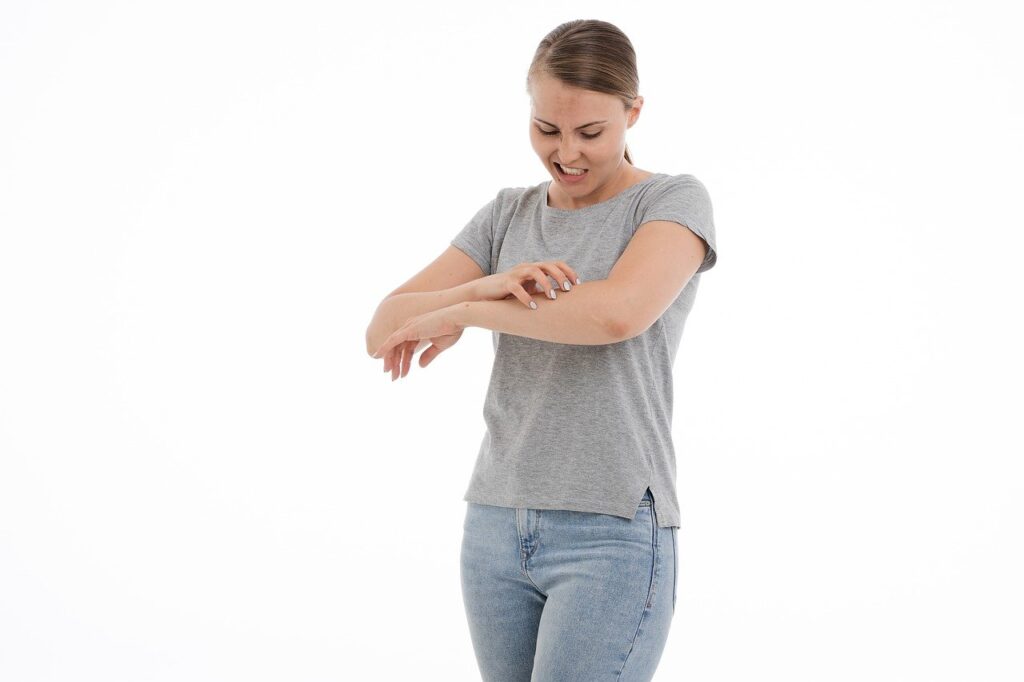
Eczema is a common skin problem characterized by itchy and bumpy skin. It affects approximately 18 million Americans, of which more than 50% are children. Unfortunately, there is no known cure for eczema. Once you have it, it is more likely to stay as a chronic condition.
Are you suffering from eczema? Or maybe someone you know is searching for a remedy. Read this article to find out more about this prevalent skin condition and discover tips on how to manage it.
What Is Eczema?
The good news is that there are ways to manage eczema so that it does not flare up or worsen. In fact, with proper skin care and avoidance of triggers, one can have total control over eczema and its symptoms. Some people also experience a natural disappearance of eczema over time.
There are different types of eczema, so it is important that you get proper diagnosis from a dermatologist to know your treatment options.
Eczema Symptoms
The symptoms of eczema may vary from one individual to another. Comparing your symptoms to another sufferer can be tricky because the skin condition shows up in different ways. However, there are some “classic” symptoms to look for and here are they:
Itchy Skin
Eczema can cause a very irritating itch on the affected area of the skin and its surrounding parts. Unlike a normal skin irritation, eczema itch can be quite unsettling. And it doesn’t usually go away easily, unless the triggering factor has been removed or managed.
Skin Drought
The areas of the skin affected by eczema can become very dry, which compounds the problem and tends to cause a bigger flare up. Eczema sufferers should make sure that their skin is always moisturized to avoid worsening the problem.
Skin Discoloration
Eczema causes swelling and discolored skin. This is also known as hyperpigmentation. The change in color may be caused by extreme scratching, or directly from the changes on the skin caused by the skin condition.
Rough and Scaly Patches
The surface affected by eczema can be rough and scaly, as opposed to smooth surfaces seen in healthy skin. This is caused by inflammation and damage inflicted by the eczema. Skin can become crusty and sometimes dead cells can break off from the surface (blisters).
Oozing
Scratching the surface of the skin affected by eczema can lead to oozing of clear fluid. Also known as “weeping”, this can be a sign that the area has been infected with bacteria. It is therefore advisable for eczema sufferers to always wash the affected portion of the skin and avoid too much scratching.
Bumps and Swelling
Eczema may also cause red, itchy bumps on the skin (such as in the case of Keratosis Pilaris). This may also lead to thickening of the skin, and the inflamed area might cause extreme itch and, in some cases, pain. The itchy bumps may contain clear fluid that could leak out of the surface of the skin.
NOTE: Many of the symptoms mentioned above also appear in other skin conditions aside from eczema. To get a proper diagnosis, consult with your dermatologist or physician to rule out other skin problems.
Eczema Causes
The exact cause of eczema is unknown. This is why there is still no cure for this skin condition. Experts, however, have linked eczema to any of these possible contributing factors:
Immune System Response
Each person has a unique response to external threats and pathogens. In the same way that human beings have unique fingerprints, every individual can have varying levels of immune system response.
Doctors and researchers found a correlation between eczema and a hyperactive immune system response to allergies. Eczema sufferers tend to react more strongly towards allergic triggers. That’s just their usual body response.
Problems With Skin Moisture
Many eczema sufferers typically have a skin type that easily becomes dry. The drier the skin gets, the more likely it is for allergic substances and dirt to settle in. If there is a problem in a person’s skin barrier, the skin will have trouble retaining moisture and can be a breeding ground for germs.
The thing is, skin types can be influenced by genetic factors. This brings us to the third contributing factor or potential cause of eczema:
Family History
Those who have a family history of allergies and asthma have a greater risk of having eczema in life. For most eczema sufferers, it’s simply a hereditary issue, while for others the condition develops over time.
Eczema Triggers
Of course, you shouldn’t confuse the “cause” of eczema to its various triggers.
A cause is the main factor from which a condition originated, while a TRIGGER is something that causes a flareup of an already existing condition.
Below are the most common eczema triggers:
Food Triggers
Food is among the top triggers of eczema flareups. Certain food types can cause an adverse reaction on the skin of an eczema sufferer and must be carefully regulated or totally avoided.
Each person is different, but generally, foods that contain a great deal of sugar, refined carbs, gluten, red meat, and dairy, can trigger eczema.
In the same way, if you are allergic of certain foods such as nuts or seafood, you have to always be aware of what you eat to ensure that they don’t contain ingredients you are sensitive to.
Stress
Each one of us have our own share of stress in daily life. The important thing to remember for an eczema sufferer is to manage stress and keep it from reaching extreme levels. A lot of people with eczema experience major flareups during stressful times, such as a physical illness, heavy workload, breakup with a partner, or a loss of a loved one.
While stress can’t be totally eliminated, it can be controlled. Doing activities like mindfulness, yoga, prayer, and spending “me-time” can help abate some of the usual stress that goes along with a busy life. Getting sufficient sleep is also essential.
Allergens In The Air
The air around us may also contain airborne allergens that can cause skin reactions for those with eczema. Allergens like dust, pollen and mold can trigger flareups. Those with eczema should take extra care during summer and spring months, where allergens from dirt and pollen tend to abound.
Airconditioning units should always be cleaned and inspected to ensure there is no buildup of mold. Homes, particularly less frequented spots like basement, attic, and dark corners, should also be cleaned to get rid of cobwebs and dirt.
Hot Weather
Prolonged exposure to hot temperatures can also worsen eczema. For some reason, the skin condition tends to act up when a person sweats excessively. Sweating and overheating may also lead to mild dehydration, which can cause dry skin. Eczema thrives on dry skin.
If you live in a place with hot weather, always ensure your house is well ventilated and that you are maintaining proper moisture on your skin. You can do this by applying gentle lotion, and having a sufficient intake of water.
Detergent
Detergent used for cleaning fabric may contain strong chemicals and substances that doesn’t suit the skin of an eczema sufferer. Also, if clothes are not rinsed properly, detergent residue may remain on the fabric and cause irritation upon skin contact.
People with eczema benefit by using mild detergents with no strong scents. They also typically do their own laundry to ensure that clothes are washed properly.
Eczema Related Conditions
Eczema is closely linked to other conditions. These conditions are also called risk factors of “comorbidities”. People who have these existing conditions also tend to develop eczema and vice versa:
Food Allergies
An estimated 15% of children below two years old who have eczema also tend to have some form of food allergy. The usual culprits are milk, eggs, nuts, and soy products. Classic symptoms of food allergies are: itchy skin, swelling of the lips or ears, skin rashes, and vomiting.
It is important to identify allergies early on, so that they can be included in an eczema patient’s history.
Keratosis Pilaris
Eczema is closely related to Keratosis Pilaris (KP), an itchy skin condition that causes bumps on the skin. In fact, KP is usually seen in individuals with a family history of eczema. It remains to be seen whether eczema causes keratosis pilaris or vice versa, but the important thing to do is treat them as two separate conditions and effectively manage the symptoms of each. Both can show an improvement by using best skin care practices (cleansing, exfoliation, removal of triggers, etc).
Asthma
Similar to eczema, asthma is a condition characterized by overreaction to allergic triggers. Interestingly, up to 20% of asthma sufferers also tend to have eczema. If you have asthma, make sure your surroundings are always clear of known allergens. There is a significant correlation and overlap between asthma irritants and eczema triggers.
Can Eczema Be Treated?
As mentioned earlier, there is no cure for eczema but there are ways to manage and treat its symptoms. We will talk about eczema treatment options in greater detail in a separate article.











Glucocontrol
Beast Force
Glucosix
Mitolyn review
Slimjaro
Salt trick review
ARIALIEF REVIEW
Natural Mounjaro recipe
Natural Mounjaro recipe
Tonic Greens
Lotto Champ review
Lotto Champ
Prodentim
Prodentim review
Sight care review